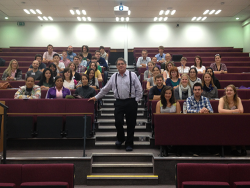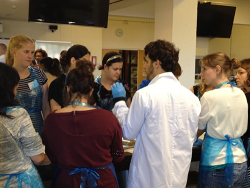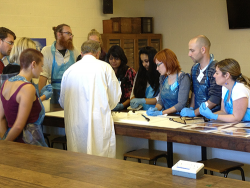Visceral Mind Summer School
The Visceral Mind Summer School, running in the School of Psychology at Bangor University from 2nd to 6th September 2013, attracted over 190 highly qualified applicants for the 40 available places. The summer school, now in its 4th year, has  proven popular with ambitious young researchers keen to share in Bangor Psychology’s world leading expertise in the field of cognitive neuroscience. The primary aim of the course, which is supported by the James S. McDonnell Foundation, is to redress an inadequacy of neuroanatomical knowledge in young neuroscientists, caused at least partially, by the limited availability of human brain tissue for providing this training to students outside the US.
proven popular with ambitious young researchers keen to share in Bangor Psychology’s world leading expertise in the field of cognitive neuroscience. The primary aim of the course, which is supported by the James S. McDonnell Foundation, is to redress an inadequacy of neuroanatomical knowledge in young neuroscientists, caused at least partially, by the limited availability of human brain tissue for providing this training to students outside the US.
Course Director Prof Bob Rafal FLSW said: “There is no substitute for the life-changing experience of examining the human brain, and no better way to learn, by both sight and touch, the three-dimensional brain.”
Prof Rafal was joined by 2 visiting academics, Dr C. Harker Rhodes, MD, PhD From the Department of Neuropathology, Dartmouth Medical School, US and Dr Antoni VALERO-CABRÉ, M.D, Ph.D. from the Hôpital de la Pitié Salpêtrière, Paris, France and Dept. Anatomy and Neurowbiology, Boston University, US who both contributed to teaching on the programme.
The course is structured to teach the functional neuroanatomy of the human brain through demonstrations of the effects of brain lesions in neurological patients, and the integration of these observations with clinical neuroimaging and neuroanatomy labs. Students  have the opportunity to learn more about a broad range of neurological syndromes including some that are very rare including disconnection of the two sides of the brain (split brain), amnesia, and agnosia – inability to recognize objects or sounds. Laboratory exercises in human anatomy, neuroimaging and brain stimulation highlight the ‘hands on’ learning strategy that drives the course.
have the opportunity to learn more about a broad range of neurological syndromes including some that are very rare including disconnection of the two sides of the brain (split brain), amnesia, and agnosia – inability to recognize objects or sounds. Laboratory exercises in human anatomy, neuroimaging and brain stimulation highlight the ‘hands on’ learning strategy that drives the course.
Over the past 3 years this course has attracted 120 students from 20 countries across the world including Argentina, Cuba, Italy, France, Spain Lithuania, South Africa, Singapore, Canada, Israel, Germany, The Netherlands and the Slovak Republic with students from developing countries being given priority for admission. This has enabled graduates of the programme to take back the cutting edge research techniques and knowledge developed at Bangor to their countries to support research in these crucial neurological issues worldwide.
Haike van Stralen, of Utrecht University in The Netherlands said: “The Visceral Mind Summer School was exactly wh at I hoped for, perhaps even more. Recently I started my PhD and noticed some 'gaps' in my knowledge, especially regarding neuro-anatomy. This course definitely filled these gaps. Although the week is quite intense, a lot information in a short amount of time, the course is so well organised that the atmosphere is relaxed and there is also time to get to know your fellow PhD students or post-docs and discuss or collaborate on research.”
at I hoped for, perhaps even more. Recently I started my PhD and noticed some 'gaps' in my knowledge, especially regarding neuro-anatomy. This course definitely filled these gaps. Although the week is quite intense, a lot information in a short amount of time, the course is so well organised that the atmosphere is relaxed and there is also time to get to know your fellow PhD students or post-docs and discuss or collaborate on research.”
“I thoroughly enjoyed my time at the Visceral Mind Course.! The Visceral Mind Summer School provides a rare holistic/multidimensional approach to learning about the brain! The summer school has enabled me to learn about the neuroanatomy of the brain by attending the lectures, and has given me a unique insight into the ‘damaged’ brain with the case conferences. The practical lab sessions, including brain dissections also provided me with a unique hands-on approach to understanding the mechanics of the brain. The staff and instructors were enthusiastic, friendly and approachable, with a genuine desire to help us learn. My time on this course has been fantastic, I have made new friends, had fun learning and cannot wait to incorporate everything I have learnt into my own research.”
Dr Saima Noreen, Post-doc researcher, Univ of St Andrews. UK.
"The visceral mind summer school is a unique opportunity for neuroscientists to learn to navigate through the 3D brain and to gain neurological insight into its functions. A must-do experience!"
Marine Vernet post-doc in Paris, France, at the Brain and Spine Institute (CNRS, Inserm, University Paris 6), in the laboratory "Cortical dynamic, Plasticity and Reeducation"
Publication date: 3 September 2013
